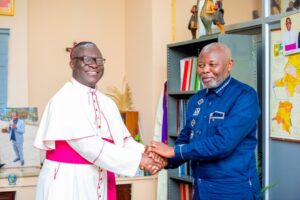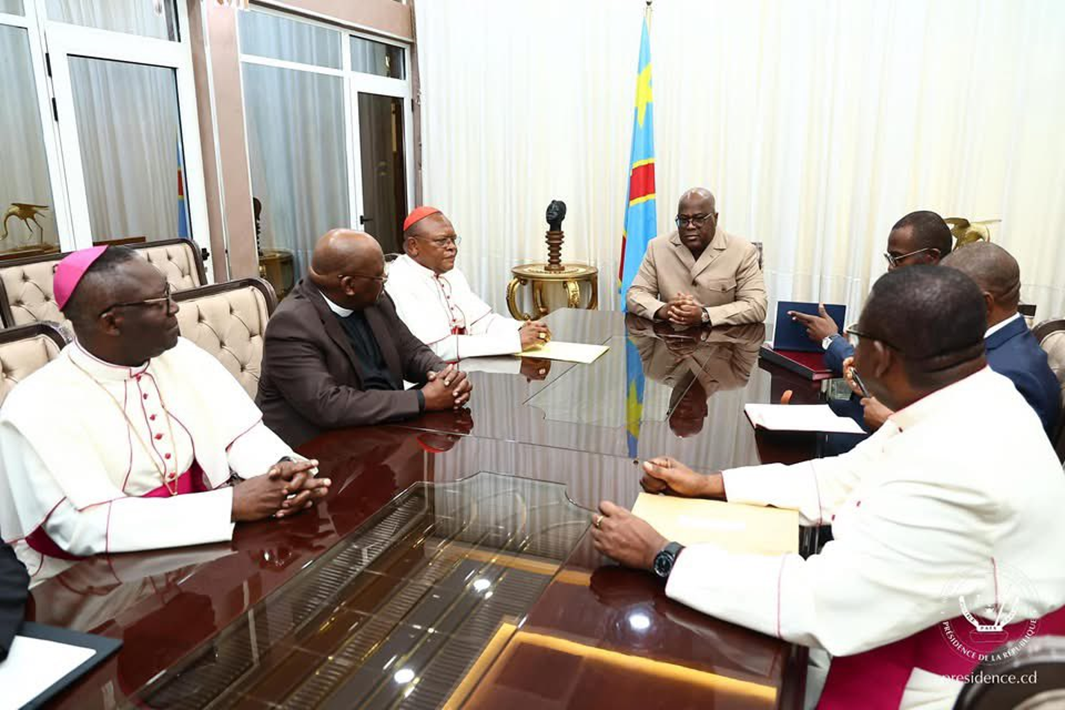Paschal Norbert
KINSHASA, FEBRUARY 4, 2025 (CISA) – In a crucial move towards resolving the ongoing crisis in eastern Democratic Republic of Congo (DRC), President Félix Tshisekedi met with a delegation of senior religious leaders from the National Episcopal Conference of Congo (CENCO) and the Church of Christ in Congo (ECC) on February 3, 2025.
The high-level meeting, held at the African Union City, was led by Cardinal Fridolin Ambongo, the Archbishop of Kinshasa, and attended by Most Rev Fulgence Muteba, the Archbishop of Lubumbashi and President of CENCO , Rev Pastor André Bokundoa, President of ECC, Msgr Donatien Nshole, Secretary General of CENCO and Rev Pastor Eric Nsenga, Secretary General of ECC.
The religious delegation of Catholic and Protestant leaders, sought to discuss the security and humanitarian situation in the east of the country, where violence by armed groups and rebels has displaced thousands. Local news outlets further detailed that the meeting was the result of a longstanding effort by Catholic and Protestant leaders to promote national cohesion and peacebuilding.
“The two churches took the initiative to design this crisis exit project that we presented today to the Head of State. He received it with great attention, he appreciated it a lot, and encouraged us. It is a commendable project,” said Msgr Donatien Nshole, spokesperson for CENCO.

Msgr Nshole was referencing the project – Social Pact for Peace and Living Well Together in the Democratic Republic of Congo (DRC) and Great Lakes Region, a joint initiative launched on January 15 by the Church of Christ in Congo, a coalition of over 60 Protestant denominations and the Catholic Church. The project – a peace roadmap, aims to address the escalating conflict and humanitarian crisis in eastern DRC, where renewed violence from M23 rebels, allegedly backed by Rwanda, has intensified. As the rebel group expanded its territorial control, it triggered a fresh wave of displacement in North Kivu, further deepening the region’s instability and suffering with claims that it has occupied the city of Goma.
President Tshisekedi, in response to the meeting, underscored the importance of national unity and a common understanding of the challenges facing the country.
“National cohesion is key to our collective destiny. We must work together for peace,” he stated, as reported by the ECC Secretary General.
In an emotional appeal, Cardinal Fridolin Ambongo assured the affected populations in North Kivu that they are not forgotten.
“You are not alone; you are always at the heart of our prayers and concerns. We take our responsibility seriously in finding a solution together,” he said.
The crisis in eastern DRC remains dire, with the rebel group M23 responsible for widespread violence and human rights abuses. The suffering of the civilian population has also intensified, prompting urgent calls for a joint robust response. In the meeting, the religious leaders stressed the necessity of national consensus and a well-coordinated approach to addressing the crisis.
Meanwhile, ahead of the extraordinary parliamentary session scheduled for January 4, CENCO had also presented the same peace plan -“Social Pact for Peace and Living Well Together,” to the President of the National Assembly, Vital Kamerhe. This proposal, championed by Archbishop Fulgence Muteba, aims to put an end to the violence in the east and pave the way for sustainable peace. Certain key provisions from the plan have been incorporated into the parliamentary agenda, reflecting the significant influence of religious institutions in the national peace process.
CENCO and ECC further plans to engage with political leaders, civil society, the opposition, and African heads of state to build a collective front against the instability plaguing the region. With the backing of the Congolese government, these efforts could mark a turning point in the quest for peace and security in eastern DRC.
